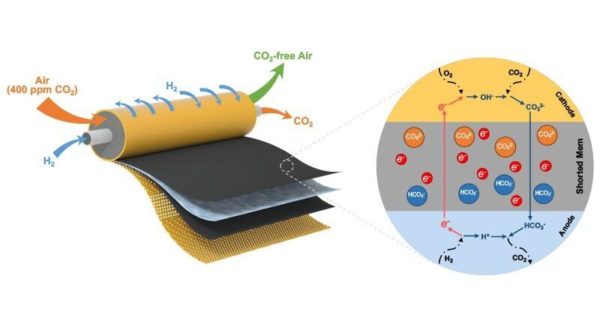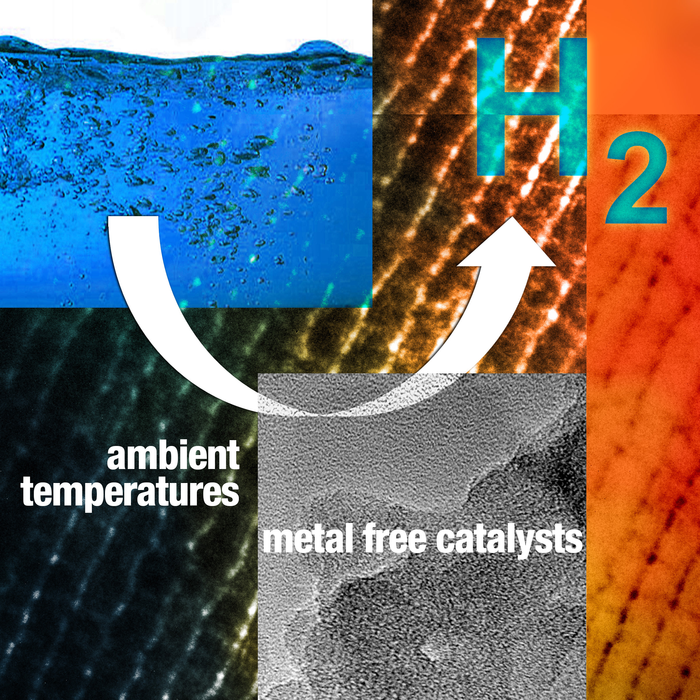The U.S. Department of Energy’s Ames Laboratory launched a new catalyst based on nitrogen and carbon to extract hydrogen from hydrogen storage materials at mild temperatures and under normal atmospheric conditions without using metals or additives. This “breakthrough” would ease current issues with chemical storage and in particular dehydrogenation, the team led by scientists Long Qi and Wenyu Huan said. “The key to its efficiency is the structure of the nitrogen. Catalytic activity can take place at room temperature because of the unique closely spaced graphitic nitrogens as nitrogen assembly which were formed during the carbonization process. The nitrogen assembly catalyzes the cleavage of carbon-hydrogen (C‒H) bonds in LOHCs and facilitates the desorption of hydrogen molecules,” the Ames Laboratory wrote on Thursday. The related article was published on January 28 on Science Advances.
A team of University of Delaware engineers has demonstrated a way to capture 99% of carbon dioxide from air using an electrochemical system powered by hydrogen. “We demonstrate an electrochemically driven CO2 separator (EDCS) to remove CO2 from the air feed using a shorted membrane that conducts both anions and electrons. This EDCS is powered by hydrogen like a fuel cell but needs no electrical wires, bipolar plates or current collectors, and thus can be modularized like a typical separation membrane,” the six researchers wrote in the article published last week in Nature Energy. The University of Delaware wrote that, as the hydrogen economy develops, this electrochemical device could also be used in airplanes and buildings. The approach tested by the team led by UD Professor Yushan Yan involves internally short-circuiting the device. “It's risky, but we managed to control this short-circuited fuel cell by hydrogen,” commented Lin Shi, a doctoral candidate in the Yan group and the paper’s lead author.

Image: University of Delaware
South African President Cyril Ramaphosa said that the country is working on attracting new investments in electric vehicles and hydrogen, adding that priority should be given to green hydrogen given the country’s “unique opportunity.” Germany is considered to be a potentially central trading partner. “Over the past year, [the] government has built on its successful Hydrogen SA strategy to make major strides in positioning South Africa as a global leader in this new market. This includes the development of a Hydrogen Society Roadmap for the next 10 years as well as a Green Hydrogen Strategy for the Northern Cape, supporting the development of a green hydrogen pipeline worth around R270 billion [€15.65 billion],” Ramaphosa said on Thursday in his 2022 State of the Nation Address. Earlier this week, the South African president appointed Daniel Mminele as head of the newly established Presidential Climate Finance Task Team. “His experience before the SARB [South African Reserve Bank] included credit-risk analysis, corporate banking, and project and structured finance at private banking institutions in Germany, the United Kingdom and South Africa,” the government wrote on Wednesday.
Norwegian consultancy and classification society DNV launched, together with 18 industry partners, a new Joint Industry Project (JIP) to enhance the standardization for hydrogen production systems using renewable energy-powered electrolysis to produce green hydrogen. “We are tackling this challenge by joining forces with major industry partners to work towards a new certification scheme and industry best practice for electrolysers which will facilitate successful water electrolysis projects. We undertook a similar approach for the wind energy industry about 30 years ago which proved to be very successful,” commented Axel Dombrowski, director Innovation & Digitalisation for Renewables Certification at DNV. Partners include BP, EDP, Equinor, Industrie De Nora, ITM Linde Electrolysis, McPhy, Shell, Siemens Gamesa, and thyssenkrupp nucera. The JIP is open for more partners to join until mid-April 2022.
Norway’s Aker Clean Hydrogen has increased its portfolio of projects and prospects currently under development to 2 GW, according to its results for the fourth quarter of 2021. Aker Clean Hydrogen was launched in February 2021. Among its key projects in the last quarter were the completion of the Hegra green ammonia project feasibility phase, the prolonged grid permitting process for the Berlevåg green ammonia project, and some developments at the Aukra project. “Aukra hydrogen hub proving to be technically and commercially viable; initial estimates showing competitive levelized cost of hydrogen,” Aker Clean Hydrogen wrote on Friday.
Energy consultancy Wood Mackenzie expects more technological solutions related to storage and chemical plant design this year, mentioning the case of Haldor Topsoe, who redesigned its ammonia plant to respond to fluctuating hydrogen supply. On the other hand, fewer hydrogen projects are expected to be announced in the next months. “Will we see the same growth rate for the CCUS and hydrogen pipelines in 2022? We don’t believe so. The coming year will be all about maturing projects and securing funding,” the consultancy wrote on January 31. Wood Mackenzie said that translating hydrogen policies into reality will be politically sensitive. On Thursday, for instance, AP news agency reported that a panel of state legislators has rejected a bill that would have provided new financial incentives in New Mexico for hydrogen fuel derived from natural gas.
Boston-based clean energy solutions company Angstrom Advanced wrote that the development of the hydrogen energy industry also depends on the creation of “hydrogen communities.” The idea is to create an integrated energy system based on hydrogen. “At present, a couple of relevant projects have been launched worldwide, including but not limited to Rugao Hydrogen Town, Jiangsu, China; Harumi Hydrogen Town, Tokyo, Japan; and Orkney Hydrogen Town, Scotland,” Angstrom Advanced wrote this week.
This content is protected by copyright and may not be reused. If you want to cooperate with us and would like to reuse some of our content, please contact: editors@pv-magazine.com.


3 comments
By submitting this form you agree to pv magazine using your data for the purposes of publishing your comment.
Your personal data will only be disclosed or otherwise transmitted to third parties for the purposes of spam filtering or if this is necessary for technical maintenance of the website. Any other transfer to third parties will not take place unless this is justified on the basis of applicable data protection regulations or if pv magazine is legally obliged to do so.
You may revoke this consent at any time with effect for the future, in which case your personal data will be deleted immediately. Otherwise, your data will be deleted if pv magazine has processed your request or the purpose of data storage is fulfilled.
Further information on data privacy can be found in our Data Protection Policy.